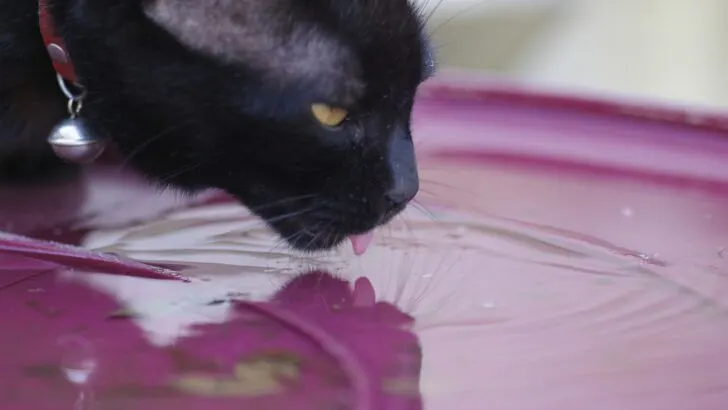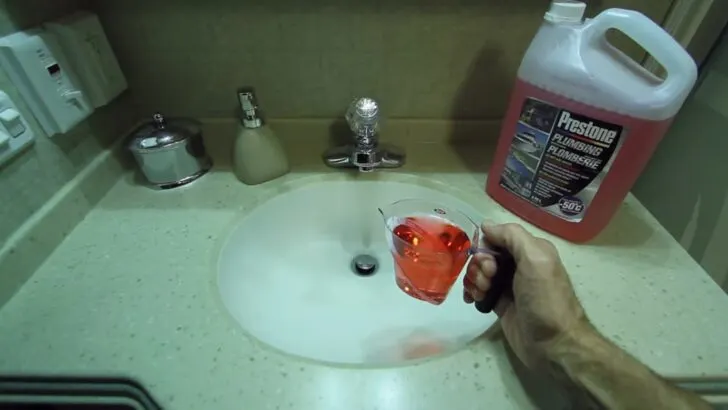It’s that time of year… temperatures have dropped and many people have their RVs stored until spring. But are they adequately protected? That’s where RV antifreeze comes in!
Lots of people blow out their plumbing lines with an air compressor (in fact, we’ve done it ourselves), but that doesn’t mean you don’t need antifreeze. There are a couple of different ways to tackle RV winterization, and both work well. But no matter how you choose to prepare your rig for cold temps, you still need some RV antifreeze.
What is RV Antifreeze?
Maybe the first thing we should mention is what RV antifreeze is NOT. RV antifreeze is not the same thing as automotive antifreeze. The two are completely different products.
RV antifreeze (“the pink stuff”) is a product that is designed for the purpose of protecting the various components of an RV’s plumbing system from expanding in the cold and bursting. It works by lowering the temperature at which water freezes (known as the freeze point). Some types of RV antifreeze also serve as a lubricant to protect seals inside RV toilets and faucets from cracking in the cold and from lack of use.
All RV antifreeze is intended to protect your RV’s plumbing system, but all RV antifreeze is not the same. Some is ethanol-based, some is propylene glycol-based, and, less commonly, some RV antifreeze is a blend of both ethanol and propylene glycol.
The safest option is propylene glycol-based antifreeze. Not only is it safe for all aspects of an RV plumbing system, but unlike ethanol-based antifreeze, propylene glycol-based antifreeze is non-flammable.
Propylene glycol also acts as a lubricant for faucets and toilet seals and leaves behind less of a taste in your fresh water plumbing than ethanol-based antifreeze. Propylene glycol antifreeze is also used as marine antifreeze for the winterization of the water systems in boats as well.
You can find this type of antifreeze in grades that are guaranteed to offer burst protection down to -50°F, and some even provides coverage down to -100°F!
What’s Different About RV Antifreeze?
Perhaps the most important difference between RV antifreeze and other antifreeze is that RV antifreeze is non-toxic to humans as long as it is used in its intended manner (in other words, don’t drink it!).
HOWEVER, RV antifreeze has a sweet scent and taste that is alluring to animals, and it can be toxic, especially to cats, even in small amounts.

Remember that while RV antifreeze is not toxic to humans when used as intended, it can still be toxic to animals. For this reason, it’s important to clean up any spills.
It can be toxic to dogs in larger amounts, so do bear all of this in mind when using, spilling, and storing your RV antifreeze. For much more on the toxicity issue, please see our post Is RV Antifreeze Toxic?
How Much Do I Need to Use?
The answer to this question depends on how you intend to winterize your RV. If you’re using an air compressor to blow out your RV water lines, you’ll need to use very little RV antifreeze, but you will need to use some. Even when you blow out all of the water lines, you still need to put some antifreeze down each drain to protect them, as well as in your toilet bowl(s) to help protect the seals.

Even if you blow out your RV’s water lines, you’ll still need to pour some RV antifreeze into your drains, toilets, and other areas to ensure that all of your plumbing is properly protected.
If you intend to use RV antifreeze to protect your entire RV plumbing system, you’ll need significantly more antifreeze, and you’ll need to run the antifreeze through the entire system. The one exception to this is the water heater.
For standard RV water heaters with a tank, you’ll want to bypass the heater before running any antifreeze through the system. Then, just open the pressure relief valve and remove the drain plug or anode rod to let the tank drain completely. The water left in the bottom of the tank won’t do any damage, even if it freezes. And, this way, you don’t need to buy enough antifreeze to completely fill the water heater tank (anywhere from 6 to 12 gallons!).
NOTE: For on-demand water heaters, be sure to follow the manufacturer’s instructions for winterizing. Some can just be drained, others may require you to protect them with antifreeze.
Our water heater flush and inspection video may be helpful to you as you seek to drain your water heater ahead of cold weather.
Once you’ve dealt with the water heater, you’ll want to be sure to run antifreeze through all of your RV’s fresh water plumbing. That means you’ll need to run antifreeze solution into the washer (or washer prep) lines, the ice maker or through-the-door water dispenser, and any dedicated filtered water spigots. (To do this you’ll want to bypass the filter and remove it, and then drain it to prepare it for use next season.)
For more detail about the amount of RV antifreeze you’ll need to properly winterize your camper, check out our article: How Much RV Antifreeze Do I Need To Winterize My RV Plumbing?
When Should I Use It?
Any time you anticipate being in an area where ambient temperatures are likely to stay at freezing (32°F / 0°C) or below, you need to completely drain your RV’s plumbing system by blowing it out with air pressure and/or by using RV antifreeze.
Note that blowing out the lines is easier if you only intend to store your rig in cold temperatures for short periods and you want to be able to put the RV back into service quickly. However, it’s important to know that blowing out the lines may not protect all of the components in your plumbing system if temps drop significantly below freezing, especially for significant lengths of time: using RV antifreeze is the better choice in these conditions because it offers more complete protection.
Water doesn’t take long to freeze (for more details, please see our post: “How Long Does It Take for Water to Freeze in RV Pipes?“), so if you anticipate freezing or sub-freezing temperatures for any length of time, be sure to winterize properly to prevent you from needing to replace plumbing lines and other components.
Where Should I NOT Put RV Antifreeze?
You should not put antifreeze in your RV’s water heater unless your brand/make/model of water heater (typically on-demand style) recommends it in the owner’s manual.
And while it’s non-toxic and generally harmless, try to avoid putting RV antifreeze in your RV fresh water tank. That will keep you from having to rinse the tank out multiple times to remove the smell and taste when you’re preparing for the upcoming camping season.
Putting RV antifreeze in your fresh water tank MAY be unavoidable because you need to run the antifreeze through the entire plumbing system and doing so may be the easiest way to accomplish that. Just be sure to thoroughly rinse the scent and taste of the antifreeze away, come spring.
While we’re on the subject, in case it’s helpful, here’s our post on sanitizing an RV fresh water tank.
What’s Your Preferred Method of Winterizing Your RV’s Plumbing System?
Out of curiosity, do you prefer to blow out your water lines using an air compressor and then use some RV antifreeze to complete the winterization?
Or is it your preference to complete your entire winterization using several gallons of RV antifreeze?
Drop us a comment below and let us know!
Free RVing Tips, Tricks, Reviews, Giveaways & More
Subscribe to our daily newsletter! We’ve been full-time RVers for 20 years (!) and share everything we’ve learned about RVing in our daily blog posts. Join our online community to receive a wealth of great RVing knowledge delivered right to your inbox.
Whether this is your first time on the road or you’re a seasoned full-timer, you’ll love the wide range of RVing topics we cover. Don’t miss a single article or any of our famous RV gear Giveaways — Subscribe today!




Jose
Sunday 11th of February 2024
"What’s Your Preferred Method of Winterizing Your RV’s Plumbing System?" Easy answer. In the two years I have owned my RV, I have never "winterized" my RV. I just follow the heat. Right now I am in Mexico enjoying the sights and staying nice and warm.
AK FIsh
Sunday 11th of February 2024
Used to fill everything with antifreeze for winter and let it soak. However, I got tired of tasting the antifreeze in my a.m. coffee for some time even with multiple drain/refills and sanitizing. BLEAH!
Now I just drain water, flush with antifreeze, drain excess out, top off all P-traps in sinks/showers then fill toilet bowl with antifreeze and forget until spring.
Spring: sanitize system with bleach then soak overnight. Then drain/refill a few times with clean water.
FYI: Bleach will last for one year when stored in a cool dry place away from direct sunlight and heat. This applies to both unopened and opened bottles. If you use Clorox, you can find the expiration date on your bleach by searching for a two-line code on the bottle above the label.
A bottle stamped A823 13019: 48CA3 was made in 2023 on the 130th day of the year, or May 10th. This would mean it expires on May 10, 2024.
TheRVgeeks
Sunday 11th of February 2024
Good tips, @AK Fish! Thanks for sharing!
sparky1
Sunday 11th of February 2024
i totally drain all lines low point drains,I use indoor /out door vacuum blow out drains/P=traps,water heater. "water filter.run pump to get water out of it. labor time easy maybe a hour,I know i;m ok. sparky1 in Va.
Greg Bernhard
Sunday 26th of February 2023
Is there going to be an after taste once you flush out the lines? How long should you flush out the lines. If there is an after taste what can you do to remove it?
TheRVgeeks
Sunday 26th of February 2023
If you don't flush it out completely, there will be a slight aftertaste from the antifreeze. But with some more flushing, it will go away. How long really depends on the amount of antifreeze in the lines (i.e. how long they are), etc. If you run water up through all of the faucets and thoroughly rinse out all the lines, you should be good (if not, just flush more fresh water through till it stops).
If you had to pump the antifreeze into your fresh water tank, and then pump from there through the lines, you'll have a harder time getting the aftertaste/smell out of the fresh tank. In that case, you may need to use something like a freshener, like this one from Camco that's designed to help eliminate the antifreeze taste/odor: https://amzn.to/3xTDJKv
Rick C
Sunday 12th of February 2023
Excellent post. I have owned several RV's over the years and currently own a 2013 Winnebago Class A motor-home. I have always used a compressor to blow out my water lines, only putting anti-freeze in the traps and toilet bowl. So far, I have not had any "plumbing issues" using this method (Knock on Wood) even though I live in Colorado, where temps can be below freezing for extended periods of time. I am curious as to what method you use in your motor-home and also what brand of anti-freeze you prefer.
TheRVgeeks
Monday 13th of February 2023
Glad to hear, Rick. Being full-timers, we don't have to winterize our plumbing very often... and, when we do, we're usually leaving the RV in a spot with relatively mild winters and low risk of freezing. So we use our compressor to thoroughly blow out our lines and then add whatever brand of antifreeze we can find locally to protect our sink/shower drains and toilet.